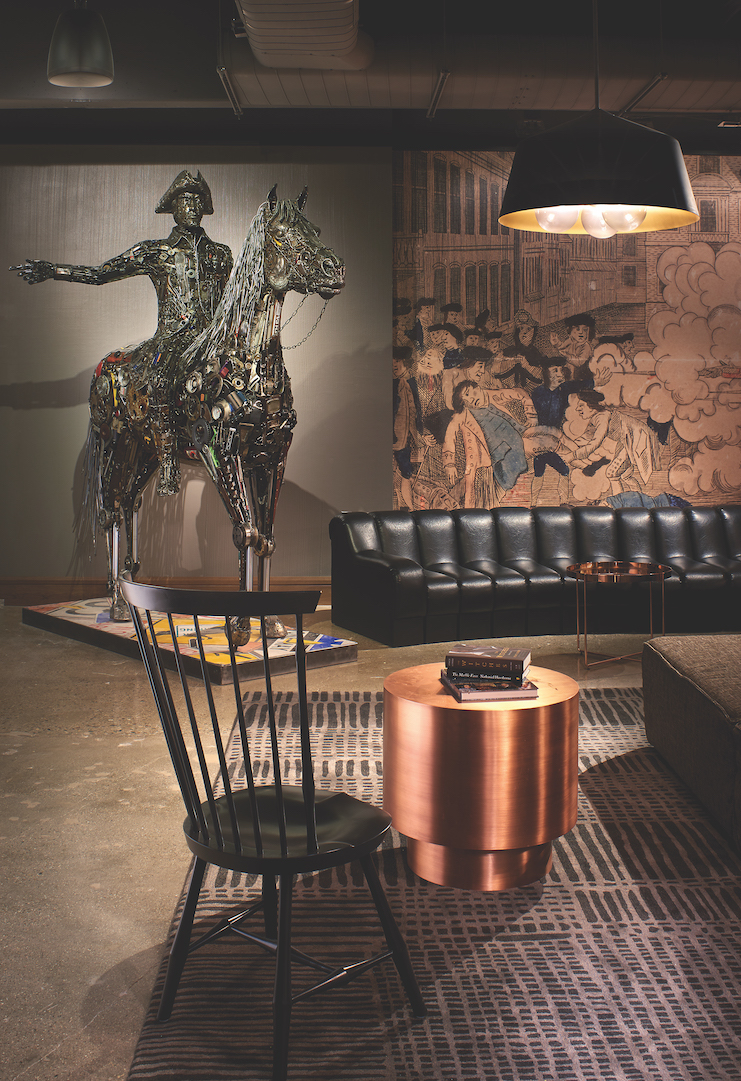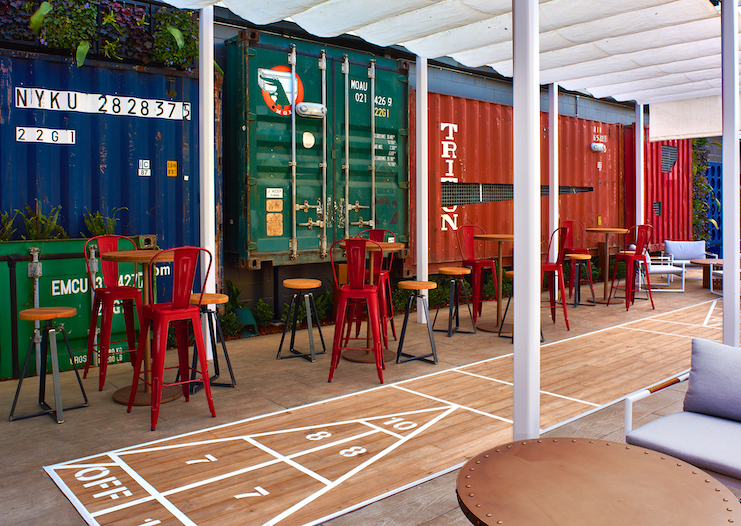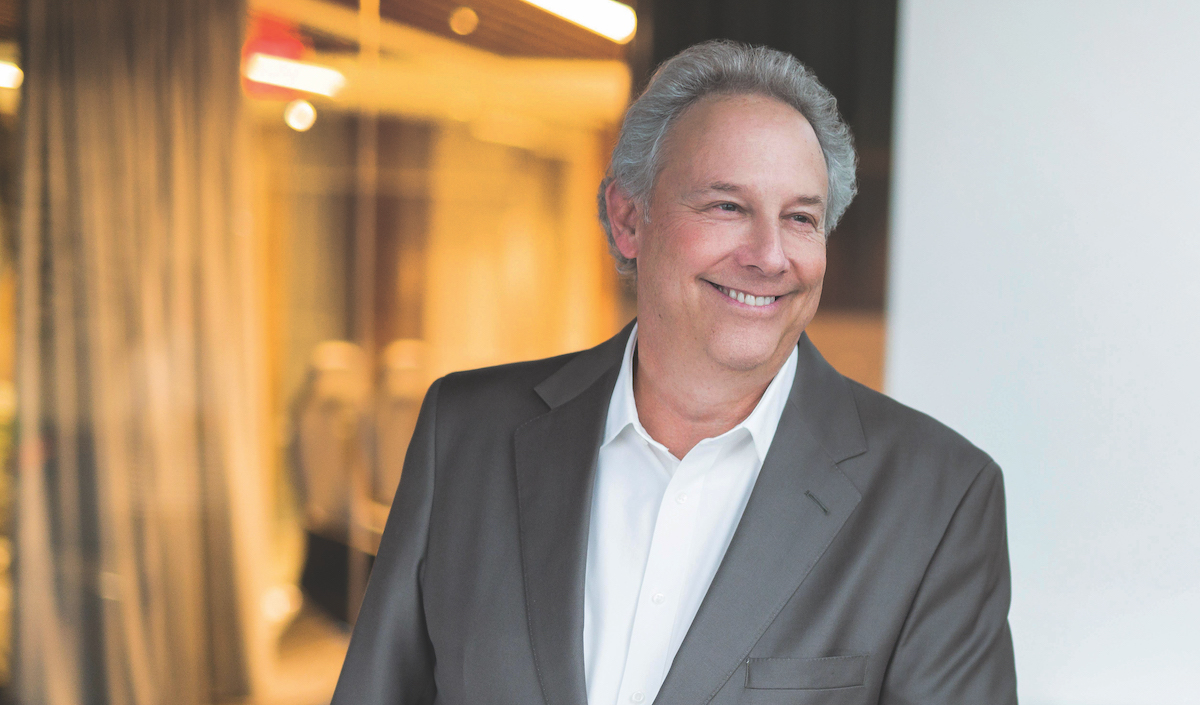Incoming Chairman of the Board of Directors of the American Hotel & Lodging Association (AHLA) Jon Bortz is founder, chairman, and chief executive officer of Pebblebrook Hotel Trust, a multi-tenant, multi-operator real estate investment trust (REIT). Bortz, who proudly holds an undergraduate degree from the University of Pennsylvania’s Wharton School, shared with LODGING details about his career path and company, his thoughts on the industry, and his hopes and plans for AHLA under his leadership.
“I love creating experiences for people and having the opportunity to make their lives better, even for just a short period of time. It combines business with community, making tangible things better by providing a unique experience where people get joy out of their travels.”
What was your career path related to the hospitality industry?
My background was commercial real estate development and redevelopment starting in 1981, when I joined LaSalle Partners (now Jones Lang LaSalle Incorporated). Over the years, I oversaw a lot of projects that involved communities and leading-edge visioning and creation of unique places like the redevelopment of Union Station in Washington, D.C., and the redevelopment of Grand Central Terminal in New York. However, I got into the hotel business, per se, by chance in the early ’90s, when a client brought us in to look at a new hotel under construction in New York that had development problems—a building that is now the Four Seasons on 57th Street. Then, in 1993, I founded LaSalle’s Hotel Group, overseeing all of LaSalle’s hotel investment and development activities, after which I founded LaSalle Hotel Properties in 1998, which included handling its initial public offering and supervising the investment of over $600 million in hotel assets for the firm’s opportunistic clients prior to the IPO, and then several billion dollars of hotel investments for our public shareholders. I served as Chairman, president, chief executive officer, of LaSalle Hotel Properties until 2009, when I retired to form Pebblebrook Hotel Trust, where I have been chairman of the board, president, and chief executive officer since our formation in late 2009.
How has Pebblebrook fared during its first 10 years in business?
Overall, it’s been a terrific 10 years for us and just about everyone in the industry, with low interest rates and a positive environment in which owners have been able to improve their properties and prepare for the next downturn—whenever that may be. But I’d break these 10 years into two categories—the first five years, which were fantastic, with RevPAR growing at high levels, and the second five, during which it has continued to grow, but not at the same pace.
How would you describe the state of the industry overall?
The industry overall is very healthy—maybe the healthiest it’s ever been—but it has grown faster than the labor pool, making positions hard to fill and driving up wages. However, the nature of the business is that people can enter our industry with a relatively modest amount of training, and we are well positioned to deal with other challenges such as short-term online rentals, human trafficking, and a lack of growth in international inbound travel.

What, if anything, are you especially concerned about?
There are two issues in particular that trouble me—immigration and international inbound travel. First, international inbound travel is incredible for our economy. People who come and travel here from abroad spend far more than people who travel domestically. The Visa Waiver program we’ve had for the last 10-15 years, where people register and are prescreened, promotes safety and security and makes it easy to travel, spend money, and create jobs here. But our country’s message must be more welcoming. While there’s a positive secular trend of global growth as countries around the world develop middle and upper classes, those people want to see the world, including America, and we’re making it difficult for them to come here—for no good reason, in my opinion. While safety and security are important, they’re not mutually exclusive. We have these great programs already set up that provide for security and that have worked historically, and we should lean on them. We should put more countries into the Visa Waver program because that provides more safety at the end of the day. Then, too, is Brand USA, a great collaborative program that, through advertising and promotions, encourages people to come here. It costs taxpayers nothing and has a demonstrable return on investment, but it has yet to be renewed by Congress. It is AHLA’s position that Brand USA needs to be reauthorized by Congress, and we were thrilled to see their work paid off at the end of last year, with the program getting reauthorized before Congress left for the holidays.
How and why did you become involved with AHLA?
My passion is about not just doing good for shareholders and investors, but doing good for everyone. While there’s nothing wrong with building a hotel to make profit in some suburban market, it’s just not for me. For me, it’s about helping the community, helping society at large, and being a participant, and at first, I didn’t see the AHLA as being aligned with that philosophy. It wasn’t until Katherine Lugar became CEO, and brought in a team to transform AHLA with a new mission that I saw the value of being part of it. Katherine came to visit our offices in Pebblebrook to convince us of the importance of becoming involved. I remember describing her as a tiger. And you know what? She brought with her a team of tigers and people who are passionate about the industry. They’re really smart and effective. I love working with them. Not only have we been effective, it’s been a lot of fun.
Why were you interested in taking on even more responsibility as a board member?
Once I was on board with the AHLA mission, the decision to be on the board followed naturally. I figured if I’m going to get involved, I’d rather have more say than less. As head of a midsized company, I embraced the opportunity to serve on the board and be active and get involved in the issues. I had never been involved in fundraising for an organization other than in my own business, but then, in 2009, I joined AHLA and since then have held roles as a member of the Executive Committee of AHLA’s Board, as an AHLA officer, and Chair of the Political Action Committee (PAC), called HotelPAC, to represent the voice of the lodging industry, including by supporting industry-friendly candidates, making members more aware of the issues that impact the industry, and mobilizing their support.
Do you have a distinct vision for AHLA as Chairman?
We just restructured to increase the revenue base of AHLA to give us more dollars for more resources to become much more active than we have been in our hotels’ local communities where there’s more happening from a legislative perspective, and more needed from an advocacy perspective. While our hotels have always been very active in communities, our push over the next year is to build out an organization politically, and from a community perspective, to be more active and be a more important resource in those communities.
We want to help them deal with their local issues, such as homelessness and mental health care, as well as the creation of jobs through our Opportunity Youth programs, which bring disadvantaged youth back into the community with jobs through our hotels and training them—including through apprenticeship programs. We also want to help people to become managers and supervisors in our hotels as a step to senior management.
I don’t think government alone can solve these community problems. There’s a real need for the local business community to help and be an active part in that. I think our hotels can take a much more active and involved role in helping cities address these issues. That is where our association is going, where it needs to go, and really, I suppose the biggest issue that I hope to be an active player in pushing forward.
My experience with HotelPAC was really about broadening the participation, not only in the PAC but in AHLA overall, and that is something we want to continue to do, particularly as we become more and more effective.

Why is AHLA important to the industry?
This isn’t rocket science. A group is stronger than an individual. We’re all stronger together, and the more people who participate, the more successful we’ll be in addressing each of our businesses issues that we deal with—whether its political advocacy, whether its local community advocacy, or whether it’s the ability to find and hire people to fill our jobs to provide services to our guests. I think the bigger and stronger AHLA gets, the more effective we’ll be together, and the better our businesses will perform at the end of the day.
From my own perspective—apart from a desire to help get this important work done—it’s been fun and rewarding to be successful in dealing with issues and making our businesses and even the world a better place, while also building stronger relationships with others in the industry. Having those interactions in a different environment has been really good for everyone. It’s been good for me personally, and it’s been good for our team at Pebblebrook, which has become actively involved in lots of different aspects of the industry through AHLA.
What might people be surprised to know about AHLA?
Although it is part of my mission to call attention to this, many are not aware of how we’re dealing not just with national issues but also with local issues, working with the local hotel associations, not just the city or state—whether they be labor focused, whether they be illegal short-term online rental focused, whether they be international travel focused.
For example, I remember when AHLA got a call about a bill specific to Denver related to the homeless. It’s hard to monitor laws in every locale. As a national origination we need member input, and, in this case, we were able to become involved after being notified. Although we need to pick our fights and our activities with limited resources, we are there to listen and learn about issues on all levels. I think oftentimes if we can’t do it, we can find a way and other resources to help with an issue.
What do you consider to be the major disruptors impacting the industry?
Of course, technology is changing the entire world and every industry is dealing with it. In the hotel world, it’s being used to actively introduce alternative lodging—something that has always been around—on an unprecedented scale through organizations such as Airbnb, providing access to accommodations not subject to the same regulations as hotels.
There’s also a lot of technology coming down the road that will change the way we operate our hotels, and offset the loss of labor while improving our product, although it requires better training and cross training.
Then, too, are changing customer preferences, leaning more to a desire for broader, more unique experiences. The challenge for our industry is gearing it more toward this growing trend of creating unique experiences and integrating that into our hotels—like seeing art as a larger hotel concept than just a painting on the wall. This customer-driven pressure to create unique experiences is not just limited to our industry; it impacts nearly every industry in the world.
What do you like about the hospitality industry?
I love creating experiences for people and having the opportunity to make their lives better, even for just a short period of time. It combines business with community, making tangible things better by providing a unique experience where people get joy out of their travels. This can even be the case for business travel in that we can provide a unique meeting room that’s experiential, like, in Skamania, a treehouse, or having memorable art in your room. We can also improve the experience through service.
I also love this industry because it’s a difficult industry and you can differentiate yourself when things are difficult.
Portrait photography by Elliott O’Donovan Photography.












